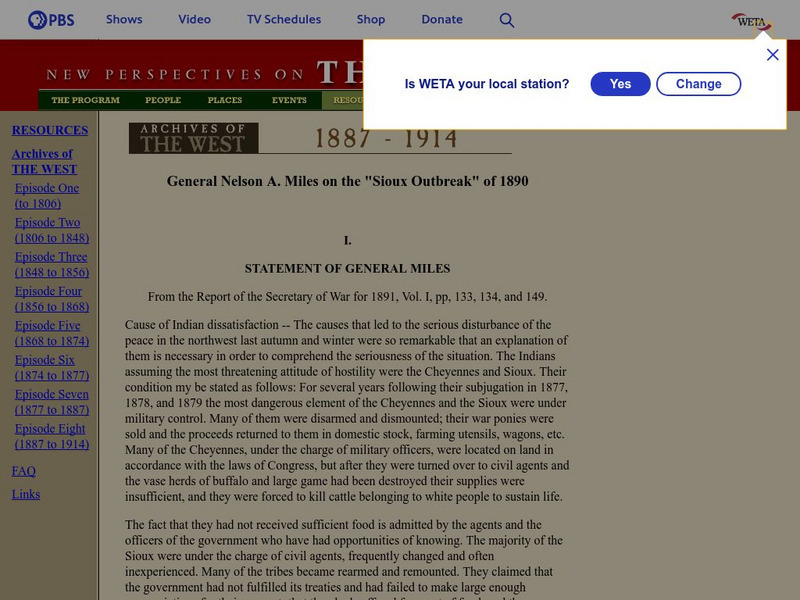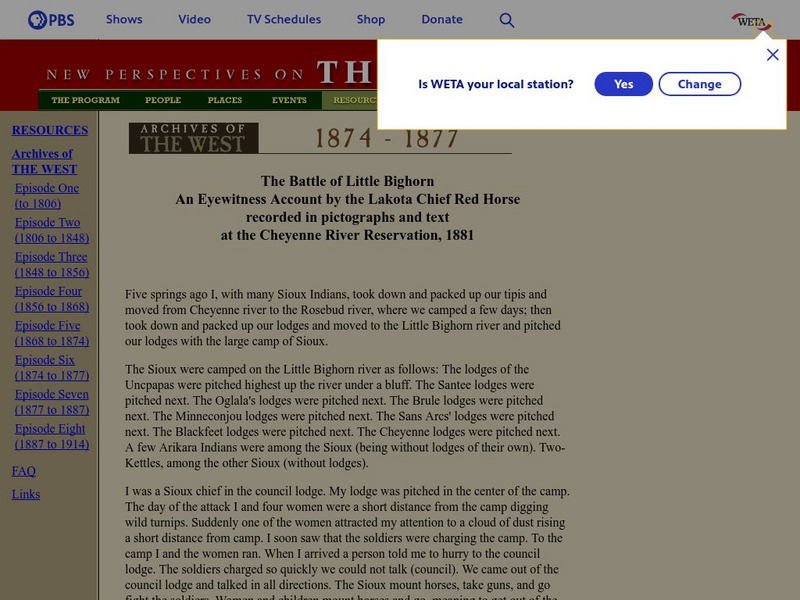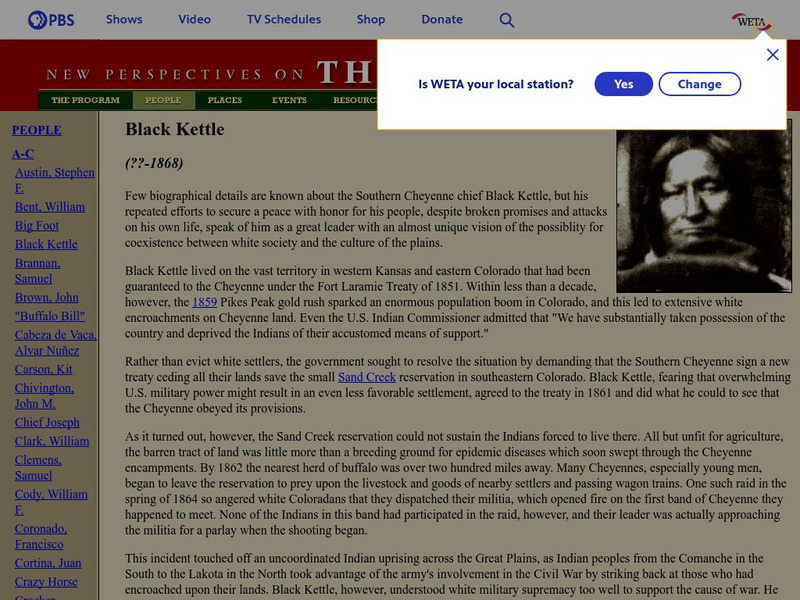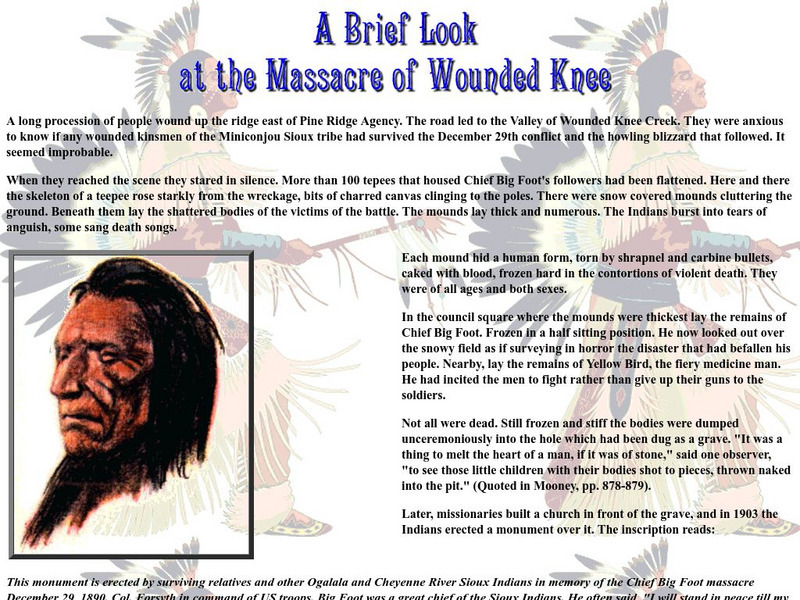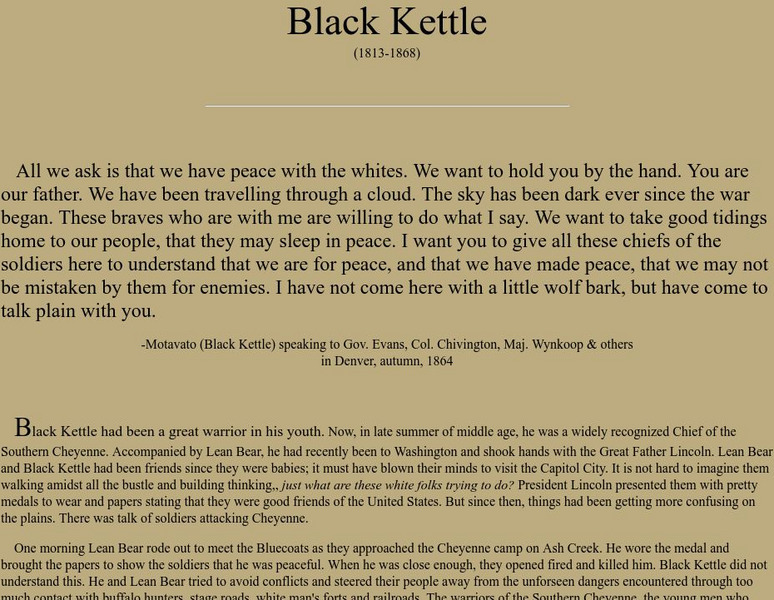Hi, what do you want to do?
New York Times
New York Times: Col. Chivington, Preacher and Soldier
[Free Registration/Login Required] An article written upon the death of Col. John Chivington in 1894. It recounts particularly his actions in the so-called Sand Creek Massacre.
Ancestry
Rootsweb: The Creek War
Following the Revolutionary War, more and more settlers began to migrate into what was the territory of the Indians. By the early 19th century, there was open hostilty between whites and Indians. Farmers wanted more land and the Indians...
Other
Colorado Historical Society: Kit Carson: A Hero in Fact and Fiction [Pdf]
A short biography of the legend of the West, Kit Carson. PDF (requires Adobe Reader).
Khan Academy
Khan Academy: Ap Us History: 1865 1898: The American West: Reservation System
Discusses the Indian reservation system, the impact it had on Native Americans, violent clashes between whites and Indians, and how it was destroyed by the Dawes Act of 1887 and resurrected in the 1930s. Includes questions for students...
Khan Academy
Khan Academy: Ap Us History: 1865 1898: Indian Wars and Battle of Little Bighorn
Discusses the series of events and conflicts in the Indian Wars that culminated in the Battle of the Little Bighorn, or Custer's Last Stand. Includes questions for students at end.
Library of Congress
Loc: Teachers: Journeys West
A series of lessons utilizing primary texts, including narratives, photographs, and maps, through which students explore the following question: "What motivated thousands of people to journey west during the 1800s?"
Khan Academy
Khan Academy: Us History: 1865 1898: Indian Wars/ Battle of the Little Big Horn
In the late nineteenth century, the US Army clashed with Native Americans, and General Custer took his last stand.
Country Studies US
Country Studies: The Plight of the Indians
This site explains how as westward expansion grew, more and more Indians encountered settlers, ranchers and miners who sought life, land, and riches out West. Conflicts between settlers and Indians soon involved the federal government...
Curated OER
National Park Service: Archeology at the Battle of the Little Bighorn
This site from the Midwest Archaeological Center provides general information on the Battle of the Little Bighorn, with additional information derived from modern excavations at the battle site.
Curated OER
National Park Service: The Indian Memorial Peace Through Unity
Memorial for the Battle of Little Bighorn, a clash of Native and white cultures, which changed both forever.
University of Missouri
Famous Trials: Chronology of the Dakota Conflict (Sioux Uprising) Trial
Contains a chart of the chronology of the Dakota Conflict trials from 1851 to 1890.
American Indian Heritage Foundation
American Indian Heritage Foundation: Crazy Horse: Tashunkewitko
A beautiful and touching biography of Crazy Horse told by Charles A. Eastman (Ohiyesa), a Sioux scholar.
US Army Center
U.s. Army Center of Military History: Anthony Wayne
This brief biographical outline focuses on dates of events in Anthony Wayne's military career. There is also a description of a portrait but the portrait itself is not currently available.
PBS
Pbs the West: Gen. Nelson A. Miles on the "Sioux Outbreak"
Statements and reports forwarded up the chain of command in 1891 about the failure of the government to provide either food or other promised support to Sioux Indians after the destruction of buffalo herds.
PBS
Pbs the West: Looking Glass: Allalimya Takanin (1832 1877)
A biography of Nez Perce Chief Looking Glass who led his band to the Big Hole Basin where they were unexpectedly attacked by U.S. army troops.
PBS
Pbs the West: The Battle of the Little Bighorn
This site from PBS is an excerpt from an 1893 book "Picture Writing of the American Indians" by Garrick Mallery which offers an eyewitness account of the Battle of Little Bighorn by the Lakota Chief Red Horse.
PBS
Pbs the West: Lakota Accounts of the Massacre at Wounded Knee
This PBS site offers excerpts from the report of the Commissioner of Indian Affairs for 1891 on the events of the Massare at Wounded Knee in 1890.
PBS
The West: Black Kettle
This is a profile of the Southern Cheyenne Indian chief, Black Kettle, who escaped death at the Sand Creek Massacre only to later be murdered by the forces led by General George Custer at Washita River.
PBS
Pbs: Archives of the West: Selections From "With the Nez Perces"
Contains selections from "With the Nez Perces: Alice Fletcher in the Field, 1889-92" by E. Jane Gay, which provided an anthropological look at the Nez Perce Indians and their bewilderment at the Dawes Act.
PBS
Pbs the West: Big Foot (?? 1890)
This article focuses on the massacre of Chief Big Foot and his followers at the Massacre of Wounded Knee.
The History Cat
The History Cat: Us History: The Buffalo Soldiers
Describes the history of the Buffalo Soldiers, African Americans who served in four Calvary peacetime units in the 19th and 20th centuries. Highlights the experiences of Emanuel Stance, a freed slave who joined the military in 1866.
Other
Powerful People: Chief Joseph, Nez Perce (1840 1904)
Many strong and insightful quotes from Chief Joseph as well as a brief biography and picture.
Other
Cyber Learning World: A Brief Look at the Massacre of Wounded Knee
Read an interesting article on the massacre at Wounded Knee written in an engaging way by a high school social studies teacher.
Other
Turtle Hill: Black Kettle (1813 1868)
Provides biographical information on Cheyenne Chief Black Kettle. Includes information about the Sand Creek Massacre.






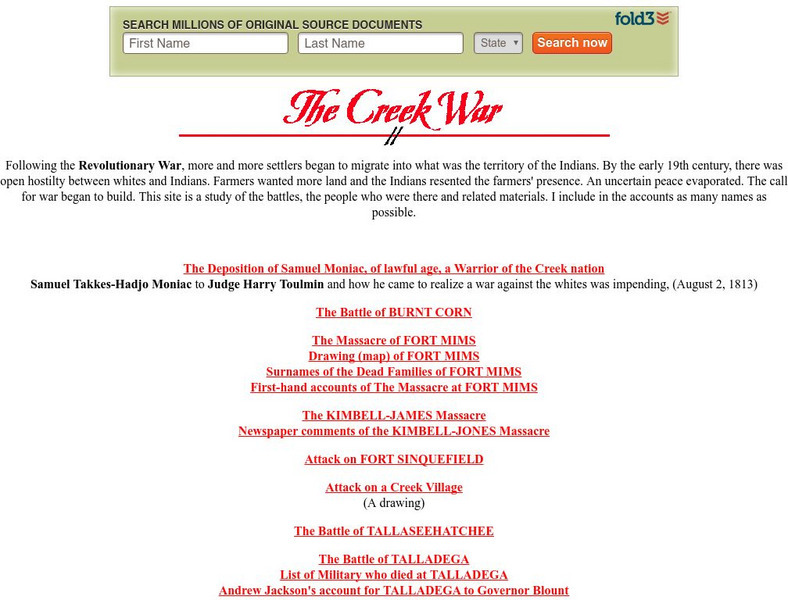
![Colorado Historical Society: Kit Carson: A Hero in Fact and Fiction [Pdf] Handout Colorado Historical Society: Kit Carson: A Hero in Fact and Fiction [Pdf] Handout](https://static.lp.lexp.cloud/images/attachment_defaults/resource/large/FPO-knovation.png)








